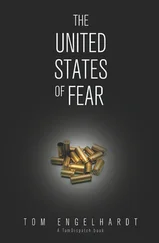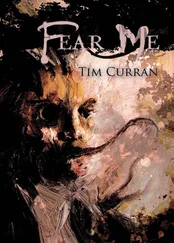He sat down on the pallet and picked up the instrument. It was identical to the one he had seen in the wood shop at The Tides, right down to the carving at the top. There was nothing to do, now, until the boy got back. But the situation was a puzzle. The boy could be warned off easily. If they posted themselves on the street they would attract attention, and if they remained inside someone could warn the boy away before they ever saw him. He was too close, now, to make any misstep. He lay the instrument back on the pallet and quit the room, latching the door.
Outside, on Lombard Street, Vic sat on the steps of a building, leaning against the stair casing, his eyes half shut, staring straight ahead while two children stood a ways off, eyeing him and giggling. Tull approached.
“This is tedious,” Vic said.
“You said you’ve been here before, right?”
“Once or twice.”
“Are there other ways in and out?”
“Pardon me?” Vic said, archly.
“Entrances.”
“I imagine,” Vic said. “The place is full of little tunnels. It’s like an anthill.”
Tull looked down Lombard Street, trying to sift through the human traffic as it walked, multiplied by shadows that were just beginning their slide toward evening. The fellow was useless sitting out there, but he was not particularly conspicuous. Still, someone might take notice. But Tull did not want him inside, chattering with his friend.
“How long must we stay here?” Vic said.
Tull started across the street. “I’ll be back,” he said.
He walked west on Lombard past three identical two-story brick houses to the corner of Eighth Street, then turned left. Past a series of three low wooden buildings, barely more than lean-tos, separated by narrow passageways. On the sidewalks along the way, Negroes sat on barrels, stood arguing by the curb. Three of them had set up a board on a crate and were playing dominoes. A one-story brick house with stairs leading down into a basement passage. No one appeared to take any notice of him. At the end of the block he turned left on South Street and made his way alongside a wall of wooden planking that stretched for a third of the block, set onto some kind of masonry footing, finally giving out at the edge of a series of sheds. Then a small brick stable that went to the corner of Seventh, where Tull turned left again and made his way back to Lombard. The fool was right about that much, at least. The place was a sieve. No way to monitor every entrance.
Three hours passed. Shadows seeped across the courtyard, like ink across a blotter. Trogdon sat on the bench, talking to the red-eyed man, who was asleep, or pretending to be asleep. There was no sign of the woman. The pot of cooking food had disappeared.
Tull could not escape the feeling that the moment was slipping through his hands and he was helpless to stop it. If he walked outside, he was conspicuous. If he stayed inside, he was at the mercy of anyone outside who could warn the boy. On Lombard, long shadows on the pavement. Trogdon’s friend was asleep the third time Tull went out.
“How long must we stay here?” the man, Vic, asked.
“Till he comes back,” Tull said, looking up and down the street.
“Let me at least come inside with the two of you.”
“I thought you didn’t want to go in.”
“Now I do.”
Two young women entered the courtyard, regarded Tull and his companions with questioning eyes, seemed to come to a quick decision, disappeared down two different hallways. A man with a withered arm walked in, looked at the trio of strangers, and went off down a hallway. A large man in work clothes appeared, looked at them unafraid, and sat down on a bench opposite the red-eyed man, to whom he made an inquiry with a subtle facial expression. The red-eyed man shook his head, barely noticeably. The bigger man pulled a small peach out of his pocket and ate it. When he had finished, he threw the pit onto the remains of the fire in the middle of the courtyard and walked back outside.
Night coming on, and Tull ran through his options. This was the city, he thought. Gangs of menacing Negroes, countless hiding places for criminals, ineffectual law enforcement, men who would not last ten minutes if they had to survive in the country. The courtyard was ominously quiet. Even Trogdon had shut up. The situation could turn bad very easily, and Tull knew it. The woman with whom he had had his encounter had not returned.
Tull went back down the passageway and examined the boy’s door and latch. Not surprisingly, the fit was inexact. He stepped inside, shut the door, took out his knife and, sliding the blade between the door’s edge and the jamb, lifted the hook with the tip of the knife. It took three tries, but he was able to drop the hook into the eyelet on the jamb, and then unhook it again, from inside. Someone could stay inside and the boy would return and think that no one was there. The boy had to come back sometime. The three of them could stay in the room, and wait.
But the odds were overwhelming that the boy had already been warned off. And, if he hadn’t, he would be. Niggertown was a spiderweb; touch it in one place and the whole thing vibrated. It had been a mistake to leave that fool outside, even across the street, looking like a frightened animal. A mistake to leave the jabbering fool in the courtyard. A mistake to bring them to begin with. Now he knew the boy was in the city. They had found his nest, and the idea that he might have slipped away infuriated Tull.
In the courtyard, he got Trogdon and his friend together and quietly offered them three dollars apiece if they would remain there with him, overnight if necessary, until the boy arrived. Tull knew it was pointless, and he didn’t want to do it, and he knew they wouldn’t, but he wanted to hear them say it.
“I don’t value my life at such a bargain,” Vic said.
“They perch like vultures,” Trogdon said. “Have you seen a vulture pull the entrails out of a squirrel? They put one of their claws on the neck and they pull at the entrails. They pull, as if you had snagged something with a fishing line. That’s a thing to avoid. I had a cousin crippled that way, trying to boat a submerged cannon. .”
Tull looked up at the sky above the courtyard, sugared and smeared with pinks and purples, banked-up clouds backlit by the last of the lurid sun. The voluptuous beauty mocked him. Spending the night there, alone, dark passageways teeming with unbroken city Negroes. . There were too many places to hide in the city, too many ways of covering your tracks, too many do-gooders to help, to keep an eye out, to warn the boy off. It disgusted him. He wanted to hit something. He turned away and left the courtyard abruptly, headed down the passageway to Lombard Street.
“Wait!” Trogdon called. The two men hurried after him.
Tull was on the sidewalk just outside the passageway in the darkening evening. He would keep the advance, as agreed upon, and return without the boy. He had bought a ticket for the minstrels on Arch Street the next evening, Friday. He would spend one more day of Stephens’s expense money, see if anyone got a message to him at the rooming house, take in the show, then get out on Saturday morning. He could get that much out of the trip to this sewer, at least.
“Where should we go now?” Trogdon said.
“You can go and stick your hat up your ass and set it on fire for all I care,” Tull said.
He drew a money pouch out of his jacket pocket, opened it, and felt the men press close, greedy.
“This was quite a fiasco,” Vic said.
“Here,” Tull said, ignoring him, looking down at the transaction. To Trogdon, he gave the agreed-upon two dollars.
“I should think we might get more, given how long we spent,” Trogdon said, counting the coins, his head shaking.
Читать дальше










